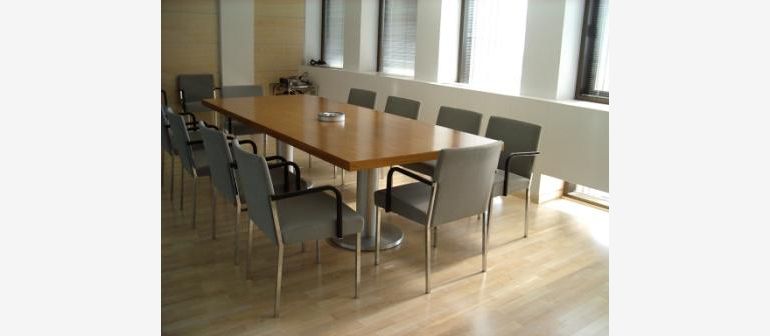Office market in Poland is definitely speeding up, and the trend is the most visible in the biggest cities. Demand for office A-class space is rising, and the amount of uninhibited flats is falling. Currently total supply of modern office space in Poland amounts to 3.5 million m2.
The Polish cities' potential is not only influenced by infrastructure, but also entrepreneurship, social activity and hidden human resources: specialised university students and graduates. The largest amount of office spaces in Poland is in Warsaw, Kraków and Wrocław. These cities also have the biggest academic centres, which is a base for investing and development.
When coming to a new market, the companies try to meticulously choose good localisation to run their activities. One of the factors they take into consideration is human resources. Because it is people who create the company and decide about its development, people who are specialists, well-educated and with knowledge of foreign languages are searched for.
Polish market has become a strong competitor on the European market of outsourcing business processes. What is attractive for international corporations is high level of education, knowledge of foreign languages and decidedly lower working costs in comparison to Western Europe. The most popular Polish cities, in which BPO services market is developing are - again - Kraków, Warsaw and Wrocław. This is where the majority of the companies wants to open their offices. As a result, there is the biggest amount of lease transactions.
Association of Business Service Leaders in Poland (ABSL), who has prepared "SSC/BPO Sector in Poland" report, has tackled a growing trend on outsourcing market: creation of Knowledge Process Outsourcing subsector and R&D Centers. Mainly young and well-educated university graduates profit from the development of these sectors.
Business centres take root in academic cities. In Kraków there are offices of such companies as: Capgemini, Philip Morris International, Shell and IBM; in Wrocław: Ernst & Young, Credit Suisse and Hewlett Packard; in Warsaw: Accenture, ABN Amro and Citi Group. What is important, operating costs in these cities are continually rising, which makes it difficult to find new employees. As a result, more and more often there are the smaller towns that win bids for new investments. Potential of small towns has been noted and will be larger in the future.
In the work market there is the most people who are graduates of arts and humanities. People with technical, mathematic and natural education are few and far between. However, the graduates of the sciences are currently the most wanted by the employers. They can also have an influence on stirring economic growth. The problem here is that educational offers of the universities do not adjust to continually changing job market, which causes a shortage of some professions and specialties.
Since three years, the Ministry of Science and Higher Education has been promoting so-called "zamawiane" studies in the cities all over Poland. Thanks to this, not only universities, but also cities provide well-educated human resources for themselves. Scholarship program includes, among other things, motivation for exceeding students, 1,000 zł big, and subsidizing a university running zamawiane studies. Universities do their best to make education more attractive by organising courses and trainings for the students. Last year, the government has given over 200 million zł for zamawiane studies. Silesian University of Technology in Gliwice has turned out to be a leader, with 43 million zł for 6 projects. Cracow University of Technology with its 4 projects has been subsidized with a total amount of 19 million zł. Analyses and research show, that people educated on zamawiane studies will be sought-after on the job market. Their qualifications and knowledge gained during studies will be a crucial part of the proper development of Polish economy.
Currently the number of people who graduate bachelor studies is 10 times larger than the number of people who go to graduate school. It may change in the near future, as the entrepreneurs not only invest in new human resources, but also book specialised studies for their current employees. As Professor Tadeusz Luty, former Vice-Chancellor of Wrocław University of Technology, argues: - this sector of higher education is considered a success, because of the businesses' cooperation with science. Wrocław is counting on IT companies, for example IBM and HP.
Entrepreneurs more and more often decide to cooperate with universities, because universities offer the best teaching staff, the highest quality of education and knowledge, based on the most recent research - assures Bartosz Dembiński, spokesman for AGH UST. Sometimes the universities are running zamawiane studies together with the companies. At Lodz University of Technology, some of the teaching staff are specialists from different companies. The studies are open to everybody, which is profitable both for the company employees, who enhance their qualifications, and for the students, who increase the possibility of getting a wanted and interesting job.
The programme of zamawiane studies is of very high significance to the entrepreneurs. Thanks to it, demand on the job market may in the future meet supply. The total number of university graduates in Poland is estimated around 400 thousand. Students' potential has already been used by, for example, HP, IBM and Samsung.
It is also worth to note, that among students there are enterprising people, who create their own companies and are looking for small office spaces. But their potential is even bigger. More and more of them decide to register their activities in academic business incubators.
The demand for office space is becoming bigger, especially in the cities having large human resources. Academic centres, which are educating the students accordingly with the needs of job market, are the most profitable for future investors. It is in these cities that business centres are created, and the development of BPO and KPO sectors inspires a demand for high-class office buildings.
